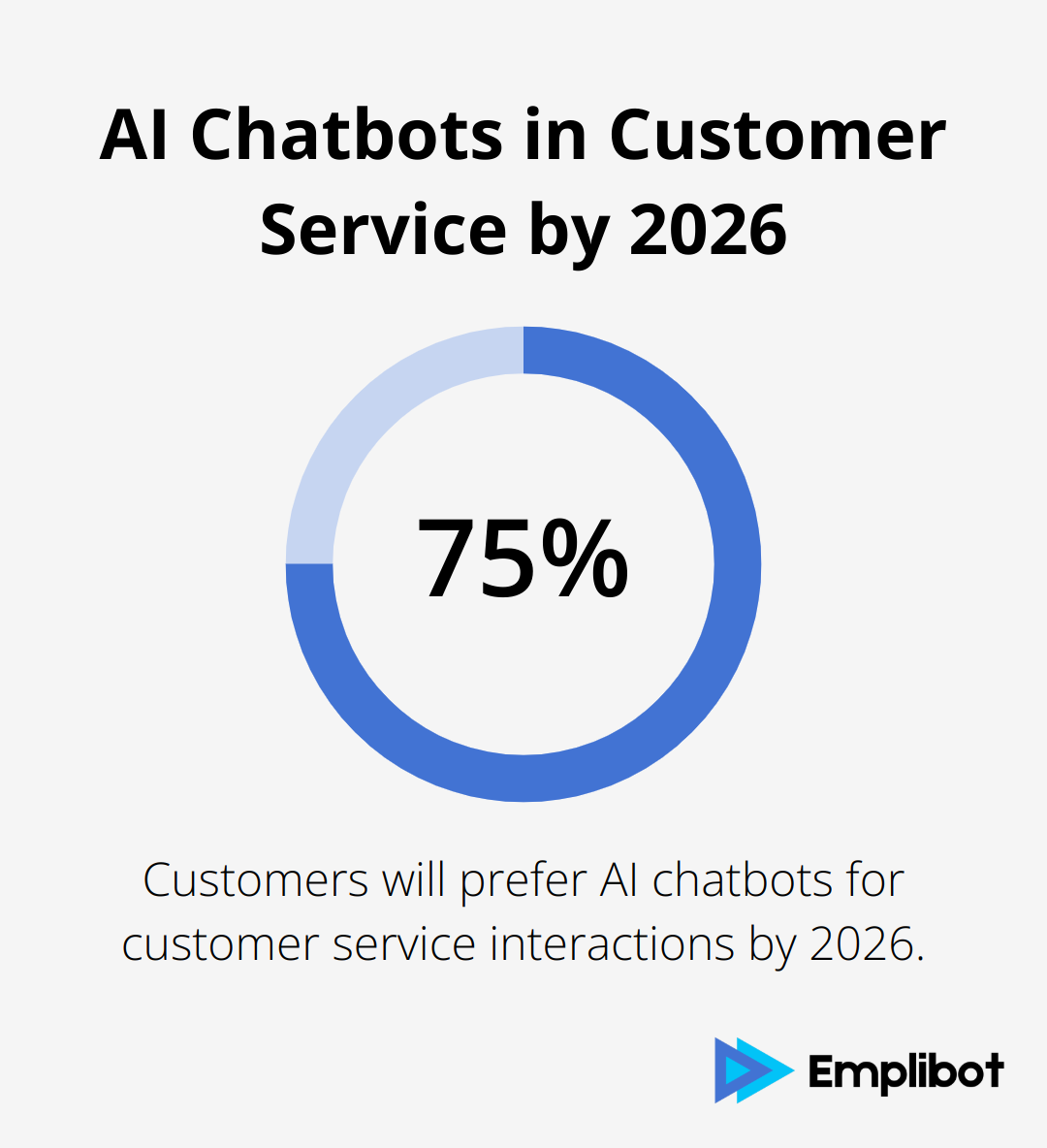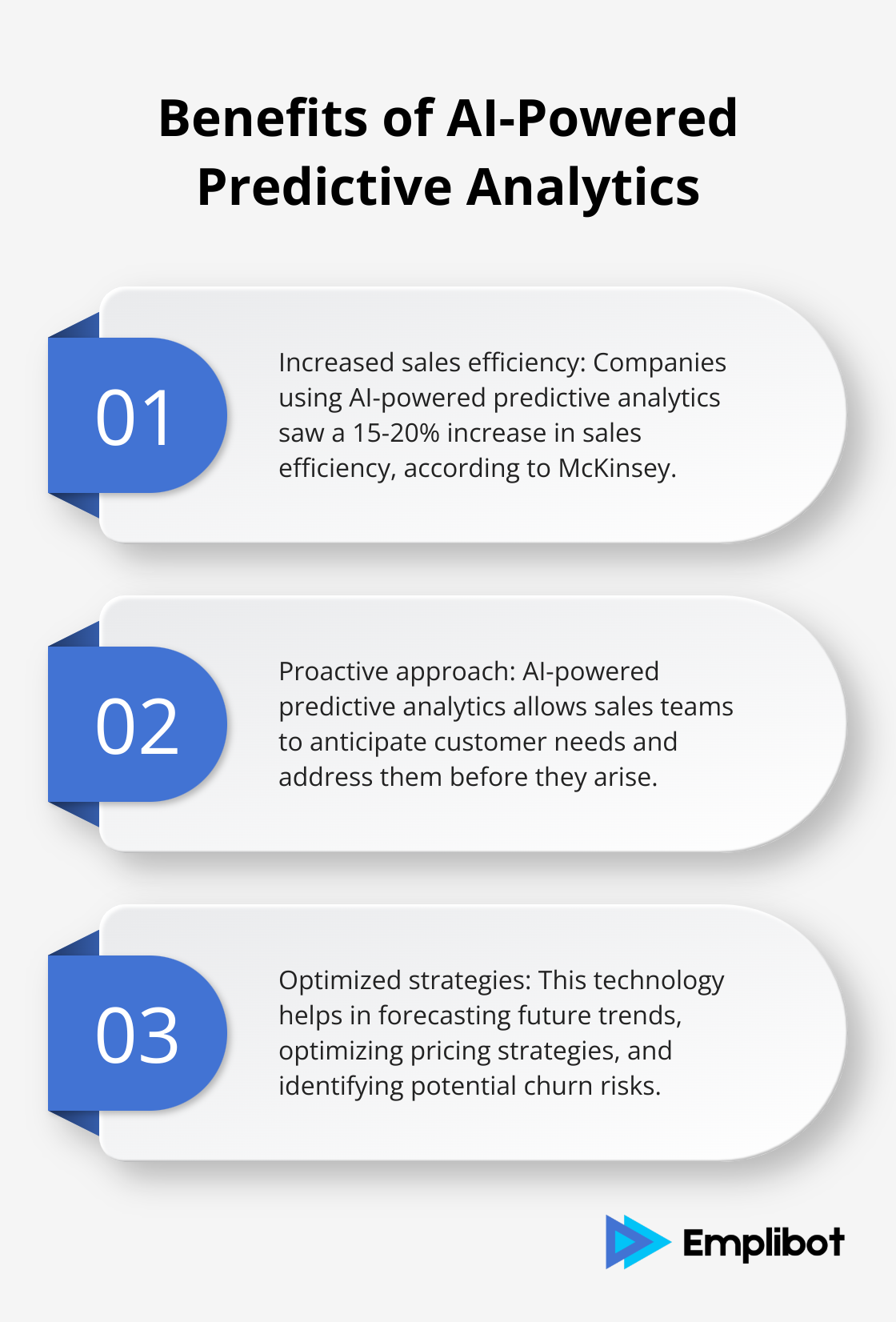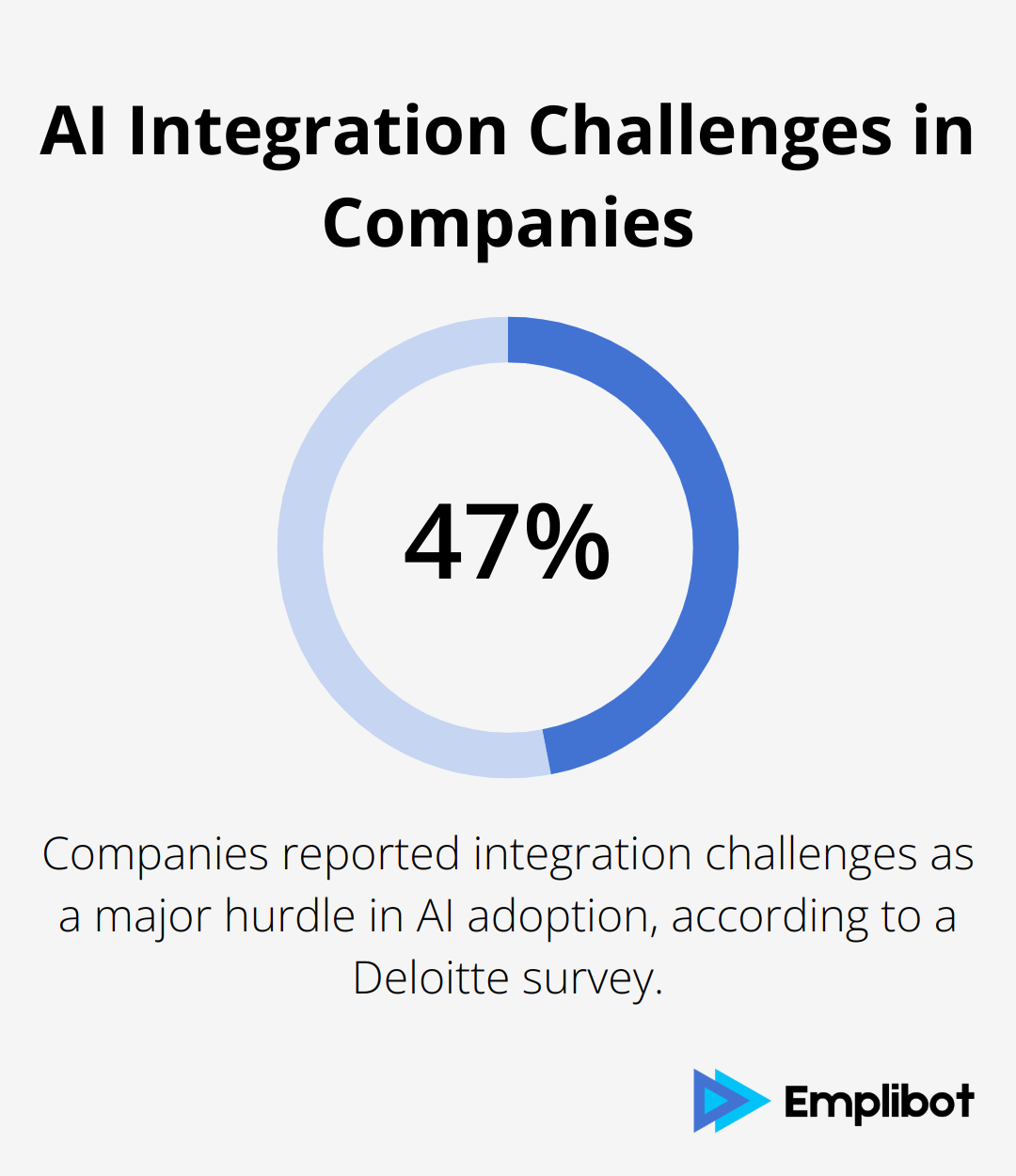AI-powered sales funnels are revolutionizing how businesses convert leads into customers. At Emplibot, we’ve seen firsthand how this technology can dramatically increase conversion rates and streamline the sales process.
Sales funnel AI uses machine learning and predictive analytics to optimize every stage of the customer journey. In this post, we’ll show you how to harness these powerful tools to boost your sales and stay ahead of the competition.
What Are AI-Powered Sales Funnels?
The Evolution of Sales Funnels
AI-powered sales funnels revolutionize the way businesses convert leads into customers. These advanced systems utilize artificial intelligence to optimize every stage of the customer journey, from initial awareness to final purchase (and beyond). Unlike traditional sales funnels, which often rely on static rules and manual processes, AI-powered funnels are dynamic and self-improving.
The Anatomy of an AI Sales Funnel
At its core, an AI sales funnel combines traditional marketing strategies with cutting-edge machine learning algorithms. These systems analyze vast amounts of data to understand customer behavior, predict preferences, and personalize interactions. AI can automatically segment leads based on their likelihood to convert, allowing sales teams to focus their efforts on the most promising prospects.
AI vs. Traditional Sales Funnels: A Comparison
Traditional sales funnels often struggle to adapt quickly to changing market conditions. AI-powered funnels, on the other hand, continuously learn from each interaction, refining their approach in real-time. This adaptive capability leads to significantly higher conversion rates. AI technology has revolutionized marketing and sales, with generative AI promising to disrupt the way B2B and B2C players think about customer experience.
Tangible Benefits for Your Bottom Line
Implementing AI in your sales process offers numerous advantages:
- Improved Efficiency: AI automates repetitive tasks like data entry and lead scoring, freeing up your team to focus on high-value activities. This automation can lead to increased productivity.
- Enhanced Personalization: AI analyzes customer data to deliver tailored content and offers, increasing engagement and conversion rates.
- Actionable Insights: AI identifies trends, predicts customer churn, and suggests optimal pricing strategies. This data-driven approach allows for more informed decision-making and strategic planning.
Real-World Success Stories
Many companies have already reaped the benefits of AI-powered sales funnels. The AI-powered sales and marketing funnel is a game-changer for B2B and B2C growth teams, transforming the way businesses approach customer acquisition and retention.
These success stories highlight the transformative power of AI in sales and marketing. As we move forward, we’ll explore the key AI technologies that make these impressive results possible.
AI Technologies Powering Modern Sales Funnels
Machine Learning: The Engine of Lead Scoring
Machine learning-enhanced lead scoring provides a unified view of lead quality. This fosters better alignment between sales and marketing teams. These sophisticated systems analyze vast amounts of data to identify patterns and predict which leads will likely convert.
AI-powered content marketing solutions utilize AI to analyze vast amounts of data, identifying potential leads with precision based on behavior. This targeted approach maximizes efficiency and improves overall conversion rates.
Natural Language Processing: Enhancing Customer Interactions
Natural Language Processing (NLP) powers AI-driven chatbots and virtual assistants. These tools understand and respond to customer queries in real-time, provide 24/7 support, and free up sales teams to focus on high-value tasks.
Gartner predicts that by 2026, 75% of customers will prefer to use AI-powered chatbots for customer service interactions. This shift towards AI-driven communication improves efficiency and provides better, more personalized customer experiences at scale.

Predictive Analytics: Forecasting Future Sales
Predictive analytics uses historical data to forecast future trends and behaviors. In sales, this technology anticipates customer needs, optimizes pricing strategies, and identifies potential churn risks.
McKinsey reports that companies using AI-powered predictive analytics saw a 15-20% increase in sales efficiency. This technology allows sales teams to take a proactive approach, addressing customer needs before they arise.

AI-Driven Personalization: Tailoring the Customer Experience
AI technologies enable hyper-personalization of the sales funnel. By analyzing customer data (including browsing history, purchase patterns, and demographic information), AI systems create tailored experiences for each prospect.
This level of personalization extends to email marketing campaigns, product recommendations, and even website content. The result? Higher engagement rates, improved customer satisfaction, and increased conversions.
Automated A/B Testing: Optimizing Funnel Performance
AI-powered A/B testing tools automate the process of optimizing sales funnel elements. These systems continuously test different variations of landing pages, email subject lines, and call-to-action buttons to determine the most effective combinations.
This data-driven approach to funnel optimization removes guesswork and allows for rapid improvements based on real-world performance data.
As we explore the practical implementation of these AI technologies in the next section, you’ll discover how to integrate these powerful tools into your existing sales processes for maximum impact.
How to Implement AI in Your Sales Funnel
Audit Your Current Sales Process
Before you implement AI, analyze your existing sales funnel. Identify bottlenecks, inefficiencies, and areas where manual intervention causes delays. This audit will highlight where AI can make the most significant impact.
If your team spends hours on manual lead scoring, AI automation could be the answer. Or if customer support struggles with repetitive queries, an AI chatbot might solve the problem.
Select the Right AI Tools
The AI tool market offers numerous options, but not all solutions will fit your needs. Focus on tools that integrate seamlessly with your existing tech stack and address your specific pain points.
For content creation and distribution, Emplibot is a top choice, automating everything from keyword research to social media posting. For lead scoring, tools like Exceed.ai have shown impressive results.
When you evaluate AI platforms, prioritize those with robust analytics capabilities. The ability to track and measure the impact of AI on your sales funnel is essential for ongoing optimization.
Integration and Data Migration
After you select your AI tools, you must integrate them into your existing systems. This process can be complex, so consider working with a specialist or the AI provider’s implementation team.
Data migration plays a critical role in this phase. Clean and properly format your historical sales data before you feed it into your new AI system. Poor data quality can lead to inaccurate predictions and suboptimal results.
Many businesses underestimate the time and resources needed for proper integration. A survey by Deloitte found that 47% of companies reported integration challenges as a major hurdle in AI adoption. These challenges included integrating data from diverse sources, preparing and cleaning data, providing self-service access to data, and ensuring data governance. Plan this phase carefully to avoid delays and frustrations.

Team Training and Adoption
The success of your AI-powered sales funnel depends on your team’s ability to work alongside these new tools. Invest in comprehensive training programs that cover both the technical aspects of the AI tools and the strategic implications for your sales process.
Foster a culture of continuous learning and experimentation. AI tools evolve constantly, and your team should feel empowered to explore new features and capabilities.
Address any concerns about job security directly. Emphasize that AI augments human capabilities rather than replaces them.
Monitor and Refine
Implementing AI in your sales funnel requires ongoing refinement and optimization. Conduct regular check-ins with your team and analyze key performance indicators. These actions will help you fine-tune your AI-powered funnel for maximum effectiveness.
Try to establish clear metrics for success and regularly review the impact of AI on your sales process. This approach allows you to make data-driven decisions about further AI investments and adjustments to your sales strategy.
Final Thoughts
AI-powered sales funnels transform customer acquisition and retention strategies. Machine learning, natural language processing, and predictive analytics enhance sales processes, leading to improved efficiency and higher conversion rates. Sales funnel AI automates lead scoring, provides 24/7 customer support through chatbots, and offers valuable insights into customer behavior for proactive decision-making.
The future of sales technology will bring more sophisticated AI algorithms and integration with emerging technologies. Businesses must assess their current operations and select AI tools that seamlessly integrate with existing systems. Proper implementation requires careful data migration and comprehensive team training to ensure success.
Emplibot’s AI-powered content creation and distribution platform helps businesses automate their content marketing efforts. This automation drives traffic, leads, and sales while freeing up valuable resources. Companies that embrace AI technology in their sales funnels will position themselves for success in the increasingly competitive digital landscape.

